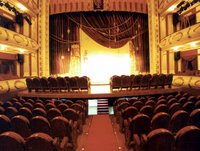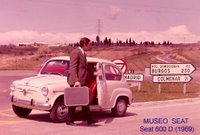
Once upon a time I used to help organize adult learning - that's evening classes to you and me. We used to write prospectuses, put together rule books and operating procedures to cover every eventuality, appoint tuors, write course descriptions, decide dates, set fees, advertise the lot, hope some people would turn up and then pester the hell out of them once the classes had started to find out why they had joined a German class or a computer course and what they hoped to gain from it. Most of it didn't have much to do with what adults wanted to learn or what tutors wanted to teach. The process seemed designed to keep a horde of quality assurers and inspectors happy.
Anyway I went to sign up for my Spanish class tonight at the local "Culture House". There was nobody much around but I found the tutor reading a magazine in the office. There were no queues of people waiting to sign up, there were no phones ringing. It was a very quiet process. I asked how much the course would cost "I'm not quite sure - it's a bit more than last year, might be 18€ for the year but I'm not sure". I asked what evening it was going to be on "That depends a bit on who turns up, probably Wednesday or Thursday." There were no questions about my ability (last year I was asked to speak a bit of Spanish for the tutor to judge which class I should join but this year the tutor thought she knew me well enough to judge - I wonder what one of the Inspection Services in the UK would have to say about that for assessment of prior learning?) Cruz told me to turn up on the 27th or 28th (after 8.30 because we have a student who helps us to take the money and he comes in when he finishes work) to check the day and pay my fees.
On the way out I picked up the prospectus and I noiced that my Spanish (Castilian) course wasn't included in it. There was ballroom dancing and Sevillanas, regional dance, Valenciano (the local Spanish language), yoga, pottery, English, computer courses, "typing", classical and Flamenco guitar, lace making, painting and craft and some music classes playing local instruments like the Dulzaina. The most expensive course is 15€ for the year, the cheapest is 6€ though there is a one time only signing on fee of 6€.
The prospectus generally has the course title, the times, the cost and the name of the tutor. The exception is the yoga which has a warning note to say that the participants shouldn't swap their place with someone else without telling the tutor and checking with the office. Those yoga people must be trouble makers!
 We went to see a Tango show at the Chapí theatre in Villena on Saturday. Tangos, of course, are Argentinian but, because they are sung in Spanish, they seem to have a sort of Honorary Spanish status. Maybe its a bit like the way we Brits don't consider Hollywood films to be foreign.
We went to see a Tango show at the Chapí theatre in Villena on Saturday. Tangos, of course, are Argentinian but, because they are sung in Spanish, they seem to have a sort of Honorary Spanish status. Maybe its a bit like the way we Brits don't consider Hollywood films to be foreign.









